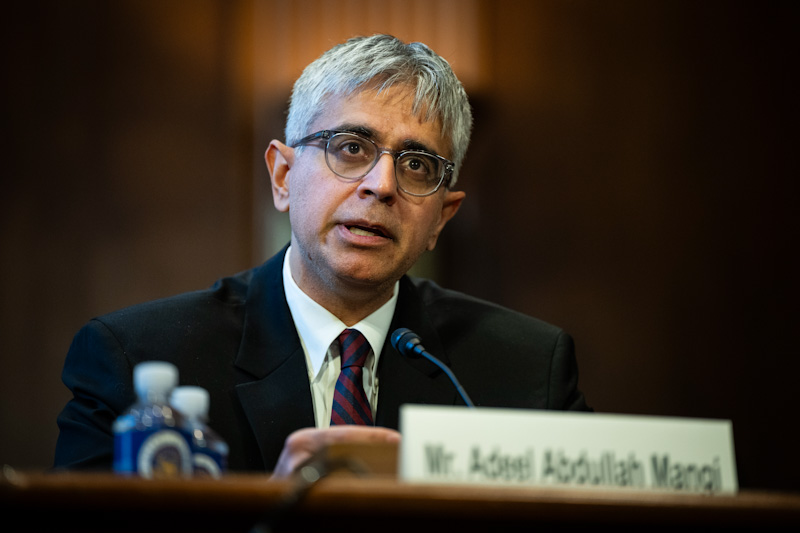Stalled 3rd Circuit judicial nominee, a Muslim, criticizes 'performative McCarthyism' of review process

Adeel Mangi, a judicial nominee for the 3rd U.S. Circuit Court of Appeals at Philadelphia, testifies during a Senate Judiciary Committee hearing in Washington, D.C., on Dec. 13, 2023. (Photo by Graeme Sloan/Sipa USA via the Associated Press)
A Muslim judicial nominee for the 3rd U.S. Circuit Court of Appeals at Philadelphia has asserted that the process for picking federal judges is “fundamentally broken” and based on “performative McCarthyism before video cameras.”
The nominee, Adeel Mangi, is a partner with Patterson Belknap Webb & Tyler who encountered opposition partly based on his affiliation with a Rutgers Law School group that examines the causes of Islamophobia.
Reuters, Bloomberg Law, Law.com and Law Dork have coverage, some of it noted by How Appealing.
Mangi’s questioning by the Senate Judiciary Committee didn’t go as expected, he wrote in a Dec. 16 letter to President Joe Biden.
“I was prepared to answer any questions about my qualifications, philosophy or legal issues,” he wrote. “I received none. Instead, I was asked questions about Israel, whether I supported Hamas and whether I celebrated the anniversary of 9/11. Even more revealing, however, was the tone. The underlying premise appeared to be that because I am Muslim, surely I support terrorism and celebrate 9/11. When I made clear that all these claims are false—that I condemn the Hamas attacks and all forms of terrorism, and indeed that it was my city that was attacked on 9/11—the next Republican senators up just repeated their performative outrage.”
The Senate questioning was based on Mangi’s service on an outside advisory panel for the Center for Security, Race and Rights at Rutgers Law School. Mangi said he attended just four meetings over four years, “yet senators sought to attribute to me the views of individuals that I do not know at university speaker events that I never even heard of.”
Afterward, ads ran characterizing Mangi as an antisemitic terrorist sympathizer, even though major Jewish organizations condemned the attacks, he said. The attacks then pivoted to Mangi’s representation of the family of a mentally ill Black man who was allegedly choked to death by corrections officers while he was handcuffed.
“This unfortunate fact remains: We have a fundamentally broken process for choosing federal judges,” Mangi wrote. “This is no longer a system for evaluating fitness for judicial office. It is now a channel for the raising of money based on performative McCarthyism before video cameras and for the dissemination of dark-money-funded attacks that especially target minorities. Nominees pay the price—and so too does our nation. Who will give up the rewards of private sector success for public service, if the added price is character assassination and wading though a senatorial swamp like this one?”
Mangi warned that the United States “faces an incoming tsunami of bigotry, hatred and discrimination” targeting “Muslims, Arabs, Jews, Black people, the LGBTQ+ community and many others. And it always pretends to be something other than what it is. These forces are fueled not only by their proponents but equally by the collaboration and silence of the spineless.”
The nominations of Mangi and three other federal appeals court judges have tanked amid a deal between Democrats and Republicans on judicial nominations. As a result of the pact, the Senate won’t hold votes on four of Biden’s appeals court nominees while advancing Biden’s district court nominees.



